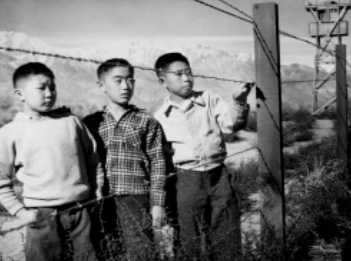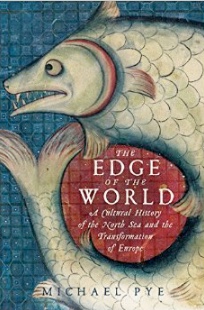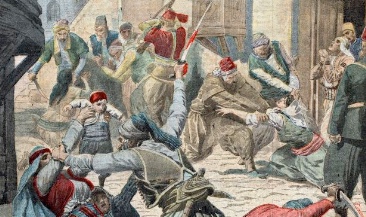History Book Reviews: Who Got Noticed this Week?

(Source: NYT, Toyo Miyatake)
Infamy: The Shocking Story of the Japanese-American Internment in World War II by Richard Reeves
Post-Pearl Harbor, American leadership was making bad decisions. "Again --" you ask? Yes. The "day that will live in infamy," as President Franklin D. Roosevelt said, became infamous for another reason: Japanese-American detention camps. The President himself signed an executive order that moved more than 120,000 American Japanese, most of them American citizens, into concentration camps that included barbed-wire and machine-gun towers. One way to escape from the camps was to enlist in the 442nd Infantry Regimental Combat Team, an army unit comprised of all Japanese-American soldiers. Twenty in the regiment received the Medal of Honor—in the year 2000.
Author: Richard Reeves, an accomplished journalist whose titles include President Nixon: Alone in the White House and President Kennedy: Profile of Power.
Reviewer: Evan Thomas is an author, historian, journalist and former editor of Newsweek. He said:
"Reeves, a veteran journalist and biographer, and Jan Jarboe Russell, the author of Lady Bird: A Biography of Mrs. Johnson have produced highly readable books that are vivid and instructive reminders of what war and fear can do to civilized peoples."

The Edge of the World: A Cultural History of the North Sea and the Transformation of Europe by Michael Pye
This book attempts to reveal how the cultural transformations sparked by Vikings, women, pirates, philosophers, artists, intellectuals who traversed the North Sea during the Dark Ages, helped to influence and create the modern world. In The Edge of the World, the author draws on original source material to illuminate this region during a major era in world history.
Author: Michael Pyeis anovelist, journalist, historian and broadcaster.
Here is an English translation of Ragnarsdrápa, a poem written by Bragi Boddason, a Norwegian court poet who served several Swedish kings. It is considered the oldest surviving Norse poem, and it was most likely composed in honor of the famous Viking Ragnar Lodbrok ('Hairy-breeches') describing the images on a decorated shield which Ragnar had given to Bragi. If you can't pronounce these, you are not alone. If you are a Viking, HNN is pleased to welcome you - and your hand-forged axes - to our vibrant audience.
It is shown to me [on the shield] that early on the son of Aldaföðr wanted to try his strength against the sea-lashed snake of the earth.
Öflugbarði's frightener grasped the hammer with his right hand, when he became aware of the boundary-fish of all lands.
Viðrir's heir's fishing-line was far from slack on Eynæfir's ski, when Jörmungandr uncoiled on the sea-bed.
And from below, the hideous thong of the path of the side-oared ship stared malevolently at Hrungnir's head-splitter.
When the writhing eel of the Völsung-drink hung coiled on the hook of the wrestling opponent of the mates of ancient Litr.
The breeze-sender, the one who cut Þórr's thin rope of the land of seagulls, did not want the twisted agitator of waves to be lifted.
Reviewer: Michael Dirda is a Pulitzer Prize-winning book critic for the Washington Post. He said:
"Pye’s book isn’t an orderly work of history; it doesn’t track the succession of kings in early Britain or chronicle the “barbarian conversion” (to borrow the title of Richard Fletcher’s excellent book about how pagans accepted Christianity). Instead, in a series of essayistic chapters, Pye looks at the Viking urge to explore, the increased use of money, the rise of legal documentation and the law profession, changes in fashion, the evolution of a scientific outlook, the status of women, the development of modern business practices and much else."
"As a former journalist and broadcaster, Pye writes without jargon, his prose is punchy (even a bit melodramatic, with an excessive use of colons), and he loads his pages with facts and anecdotes."
"“The Edge of the World,” then, is something of a grab bag or, perhaps, a Viking hoard. You never know what you’ll learn."
"Pye, like a scholarly magpie, picks up his glittering bits from the most up-to-date academic research."

(Source:Le Petit Journal, 12 December 1915.)
The Fall of the Ottomans: The Great War in the Middle East, 1914-1920 by Eugene Rogan
In The Fall of the Ottomans, Eugene Rogan chronicles the First World War and its immediate aftermath in the Middle East, unveiling the often over-looked story of the Ottoman Empire, and its crucial role in the conflict. It details the post war settlements which led to the partition of Ottoman lands between the victorious powers, and were the precursor for the continuous conflicts that exist in the modern Arab landscape. The Armenian Genocide of 1915 is also explored in this book. Just a little over a week ago, this event was commemorated in a 100th Year of Remembrance gathering in Washington, DC.
Author: Eugene Rogan is an Associate Professor of the Modern History of the Middle East at the University of Oxford.
Here's a poem by Shahe Mankerian from an Armenian poetry website. We gave the Vikings some shine this week, and Armenians deserve it as well.
"Mother Gives Dementia a New Name"
The television bleats like a kumquat sheep.
The Ojibwa postman knocks on the door
when she washes the feet of the dining table.
Lucullus must be her lover; she sees him
sitting in the coffee residue. We don’t let her
kiss the demitasse. In the backyard,
the apricot tree hangs her Komitas;
her chemise hangs from the terracotta chimney;
she hangs Armenian poems on the clothesline.
When the telephone doesn’t ring, she speaks to it:
The cat likes to sleep in the refrigerator.
She calls all her sons, Rostom, and offers
the cleaning lady lozenge because she coughs
like someone’s daughter.
Reviewer: Bruce Clark is the religion and public policy editor of The Economist. He said:
"Using personal histories to leaven what might otherwise have been a heavy diet of places, names and dates, Rogan neatly links the Turks’ costly success at the Dardanelles with the dreadful events that unfolded about 1,000 miles away, on the eastern edge of present-day Turkey."
"In what is a manageably sized book, Rogan feels he must spend several pages on the motives of the Ottomans’ adversaries, especially Britain; that limits the space he can devote to bringing the Ottoman side of the story to life."